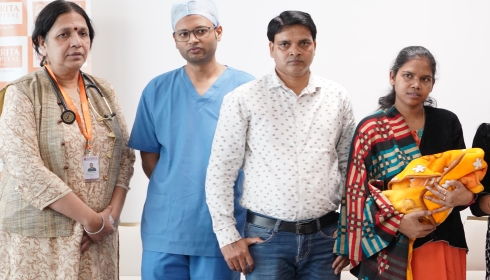
Rare: 6-day-old baby gets successful dialysis
In a complex and lifesaving procedure, doctors at Faridabad’s Amrita Hospital have given a new lease of life to a six-day-old highly underweight baby girl weighing merely 1340 grams, suffering from acute kidney injury since birth, by providing peritoneal dialysis upon her.
The doctors pointed out that giving peritoneal dialysis was a complex procedure, which in the present case was even more challenging as the baby was highly underweight. They said that the baby did not pass urine even after six days of her birth which alarmed her mother. On evaluation, it was found that her creatinine level reached 5.8.
Dr Hemant Sharma, Consultant, Department of Neonatology, Amrita Hospital, said, “Acute kidney injury is common among young babies in NICU, affecting almost 10-20% of babies. However, severe acute kidney injury requiring dialysis is extremely rare. Dialysis of such small babies is rarely done anywhere in the world and the success rate is extremely low.”
Speaking to Drug Today Medical Times, Dr Sharma said, “The mother suffered from very high blood pressure during pregnancy, which could be the major cause of developing acute kidney injury in this patient."
Due to high blood pressure, doctors had to put the mother into preterm labour,” he added.
“In India, dialysis is not done upon such small babies. In Delhi, one or two dialysis has been conducted twice, but successful recovery post dialysis in such babies is rare because they have the chance of developing infection. In the reported literature of a Turkey hospital, only three out of ten babies have survived after undergoing peritoneal dialysis. These babies were less than 500 grams,” Dr Sharma added.
He further said that usually, a child passes urine after 24 hours of the birth but this baby did not pass it even on the sixth day. This further deteriorated her condition due to which she developed swelling in her hands and legs and she did not take milk.
“Thereafter, her platelet started falling and during low platelets doing operations and dialysis becomes even more difficult. However, we somehow managed it. The baby in this case had a low nephron reserve. There was also a high risk of infection of her abdominal lining.
“We decided to use peritoneal dialysis to clean the waste from her body. A cleansing solution was slowly injected into her belly and then washed out, bringing the waste out of the body with it. Several in-and-out fluid cycles were conducted, spread across nine days till her kidneys got time to heal. We opted for peritoneal dialysis instead of haemodialysis because the latter is generally not performed on such small children,” Dr Sharma said.
“Despite this challenge, we maintained strict asepsis and did not use any higher antibiotics. As of now, the child is being fed by her mother. Her creatinine level is normal and she is passing urine normally. She is also gaining weight,” he added.
Dr Urmila Anandh, Head of the Determent of Nephrology, said, “Kidneys are necessary to remove waste from the body. However, if they cease to function for some reason, such as prenatal damage, the blood becomes clogged with waste. This interferes with the baby's ability to eat and causes lethargy, bleeding, and swelling of the body. It can also affect other organs such as the brain, heart, and lungs.”
She said that the unique thing about this case was that the baby did not develop any infection and required ventilator support.
“You cannot even administer haemodialysis to even a patient of five years and this baby has tiny hands and it was not possible to find veins to give dialysis. In my entire career it did not find any patient who recovered from acute kidney injury,” she explained.
“We had thought this baby might not recover but the baby is doing well, and her organs are functioning satisfactorily, and she is passing urine properly. I do not think that she will develop kidney disease in future. But such kids need to be brought up very carefully as they have a high chance of developing high blood pressure,” Dr Anandh added.